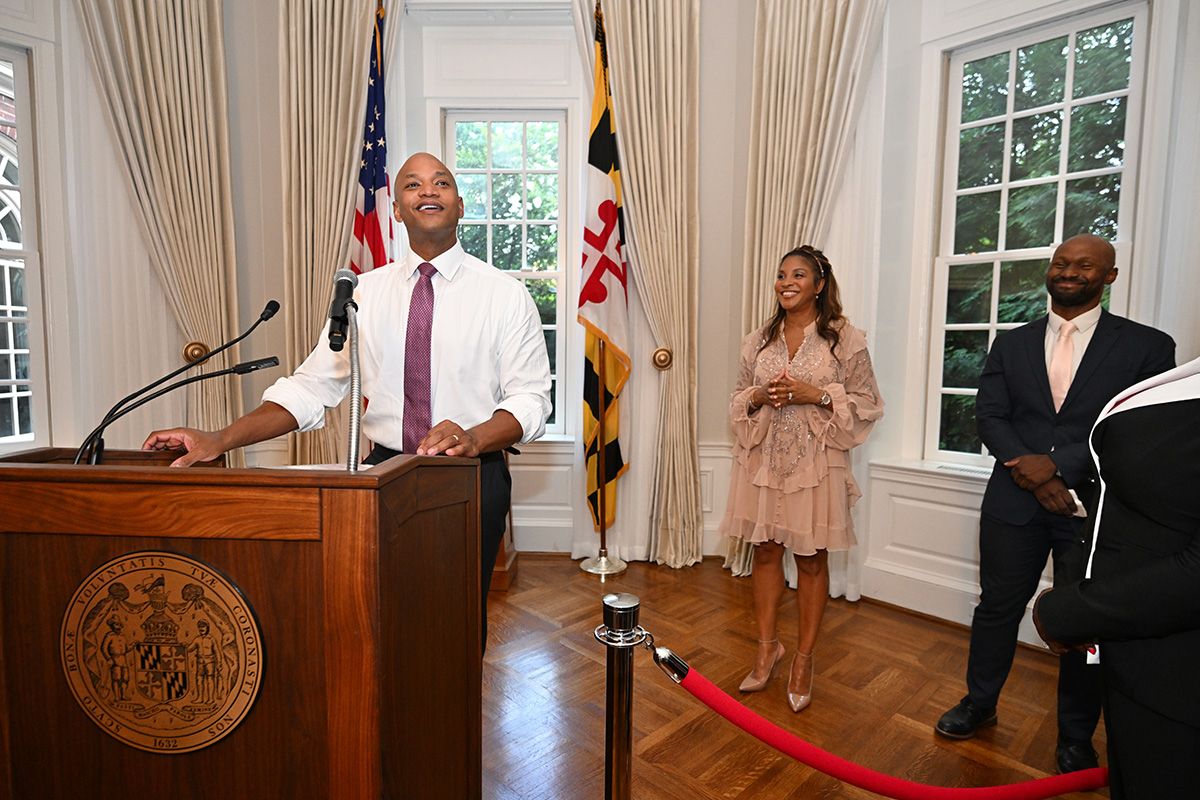Maryland
Ashanti Martínez poised to represent District 22 in Md. House of Delegates
Howard University alum is Afro-Latino and openly gay

Ashanti Martínez is set to become the first man of Latino descent to represent District 22 and the first openly gay member of the Maryland House of Delegates to represent Prince George’s County.
Following his unanimous selection from the Prince George’s County Democratic Central Committee to fill a vacant House seat on Feb. 9, his nomination now goes Democratic Gov. Wes Moore, who has 15 days to make the appointment official.
Martínez, 26, is a Howard University alum. He would succeed now-state Sen. Alonzo Washington (D-Prince George’s County), who the committee nominated to finish Maryland Energy Administration Director Paul Pinsky’s term in the House after he joined Moore’s administration.
Martínez, 26, felt honored by the nomination.
“For me, titles and positions are important, but they’re not all it is — it’s about doing the work,” Martínez told the Washington Blade on Monday during a telephone interview. “And so being able to be in a position where I have a larger platform to continue the work that I’ve been doing … it’s an honor of a lifetime.”
Likewise, he believes his selection shows how Prince George’s County is “embracing diverse voices of leadership.”
Martínez, who ran for the House seat twice before and didn’t win, finds the opportunity to serve a “little bit of a delay, but not a denial,” he said.
“Also, I think I give a different lived experience than a lot of the other members,” he added. “I think there’s a lot of great aspects of our county that oftentimes don’t get highlighted because folks don’t live through those experiences. So, encompassing all of the things that I bring to the table, is going make people feel more seen and involved in government.”
Recognizing the period to introduce a bill has passed, Martínez said he will look for other ways to create legislative work on the House floor and co-sponsoring other lawmakers’ measures. Martínez added he will let the public know that his office is open to them.
“I will serve for as long as my community wants to have me,” he said. “I don’t necessarily have a goal about, ‘I want to be in this position, or in this place,’ I just want do the most that I can, for as many people as I can, for as long as I can.”
Maryland
LGBTQ suicide prevention hotline option is going away. Here’s where else to go in Md.
Changes will take effect July 17

By ANNA RUBENSTEIN | The national suicide prevention hotline will no longer offer specialized support to LGBTQ people, starting July 17, the Trump administration announced last week.
Dialing the hotline at 988 will still be available for crisis support. But callers will no longer be able to reach specific LGBTQ services by pressing Option 3. The change worries advocates because their data shows the LGBTQ community has a disproportionally high suicide rate.
Even after the option ends, here’s how to receive tailored support if you’re in Maryland.
The rest of this article can be found on the Baltimore Banner’s website.
Maryland
Silver Spring holds annual Pride In The Plaza
‘Today means inclusion. It means to build resilience’

Silver Spring’s annual Pride in the Plaza event took place on Sunday to celebrate the LGBTQ community and emphasize inclusion and resilience.
“Today means inclusion. It means to build resilience, love,” Robyn Woods, program and outreach director for Live In Your Truth, which organized the event, said. “I mean, just being surrounded by the community and so many great entrepreneurs, business owners, and just being a part of this whole rainbow coalition that we call the LGBTQIA to be about.”
With the event being her first time organizing for Live In Your Truth, Woods said she felt emotional to see the support and love at the event.
“Some people (are) bringing out their children, their babies, their grandparents,” Woods said. “It’s a lot more allies here than anything else. That type of support to me means so much more than just support from my community; just outside support, inside support, so much support around it, so much love. Everyone’s smiling outside, helping each other.”
Attendees of the event were able to head over to the Family Fun Zone, an air-conditioned Pride Cool Down Lounge, or watch live drag performances in the main stage area.
Along with entertainment and a shaved-ice stand, rows of information tables stood along the plaza, including FreeState Justice, the Washington Spirit, Trans Maryland, Moco Pride Center, and the Heartwood Program, an organization that offers support, therapy, education, and resources to the LGBTQ community.
“I want people to know about our services, and I love what we have to offer,” Jessica Simon, psychotherapist for Heartwood Program’s Gender Wellness Clinic, said. “I (also) want to be part of a celebration with the community, and so it feels good to be here with other people who have something they want to give to the community.”
She added that within today’s political climate, to which she called an “antidote to shame,” it’s important to be celebrating Pride.
“There’s a lot of demonization of LGBTQI people,” Siena Iacuvazzi, facilitator for Maryland Trans Unity, said. “(Pride) is part of the healing process.”
Iacuvazzi said she was taught to be ashamed of who she was growing up, but being a part of a community helped her flourish in the future.
“I was taught how to hate myself. I was taught that I was an abomination to God,” she said. “But being a community is like understanding that there are people who have experienced the same thing, and they’re flourishing. They’re flourishing because they’re willing to stand up for themselves as human beings and discover themselves and understand what’s true for themselves.”
She added that Pride allows for a mutual understanding to take place.
“It’s more of a sense of belonging … and just taking that home and understanding you’re not alone,” Iacuvazzi said. “We’re each taking our own journey — we’re not putting that on each other. It’s just walking away with a sense of belonging and humanity.”
Similar to Iacuvazzi, Woods said she hopes attendees’ biggest takeaways would be family, fun, resilience, and pride.
“Being proud of yourself, being happy for who you are, and representation and how much it matters,” she continued. “And I think all these young people that are walking around here get to see versions of themselves, but older. They get to see so many different lesbian, gay, bisexual, pansexual people that are successful, that are showing love, that care, and it’s not how we’re portrayed in the media. It’s lovely to see it out here. (It’s) like we’re one big old, happy family.”
Maryland
Wes Moore hosts annual Pride reception
‘Nobody should have to justify their own humanity in Maryland’

Maryland Gov. Wes Moore on Wednesday hosted his annual Pride month reception at Government House in Annapolis.
“One of the things that makes me so proud to be the governor of the great state of Maryland is that we are a safe haven for the LGBTQIA+ community,” Moore. “And I want to be clear that is a reputation we intend to keep.”
Organizations like FreeState Justice and the New Wave Singers of Baltimore gathered in attendance as speakers, including Moore, Maryland first lady Dawn Moore and FreeState Justice Executive Director Philip Westry spoke to the crowd of around 175 people.
In his speech, Moore acknowledged the accomplishments made with organizations and individuals within the audience, including passing the Trans Health Equity Act within his first 100 days in office.
A month after his first 100 days in office, Moore emphasized how an executive order protecting gender-affirming care in Maryland was signed, as well as more recent initiatives to decriminalize HIV and promote best practices in HIV prevention and care.
“But I want to be clear: we cannot — and will not — stop fighting. We must stand up and protect all of our fellow Americans — lesbian, gay, bisexual, transgender, queer, intersex, asexual … all identities,” Moore said. “Because what we are seeing out of this new White House is the latest chapter in a long playbook of demonizing specific groups for political gain. It isn’t just cruel and immoral — it also masks the humanity of our fellow Marylanders. Nobody should have to justify their own humanity in Maryland. So we are going to fight.”
-

 U.S. Supreme Court4 days ago
U.S. Supreme Court4 days agoSupreme Court upholds ACA rule that makes PrEP, other preventative care free
-

 U.S. Supreme Court4 days ago
U.S. Supreme Court4 days agoSupreme Court rules parents must have option to opt children out of LGBTQ-specific lessons
-

 District of Columbia5 days ago
District of Columbia5 days agoMan sentenced to 15 years in prison for drug deal that killed two DC gay men
-

 Federal Government5 days ago
Federal Government5 days agoWhite House finds Calif. violated Title IX by allowing trans athletes in school sports










